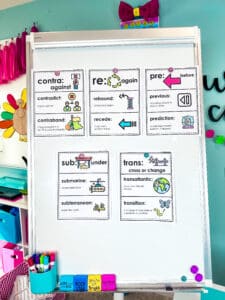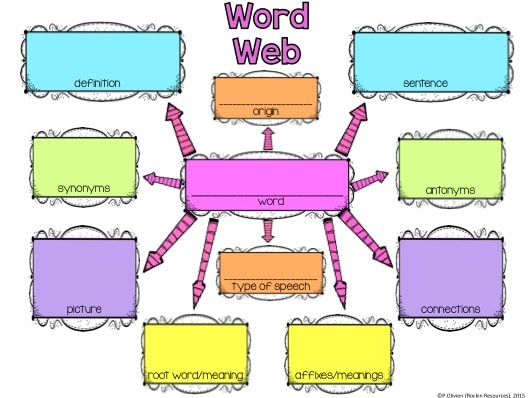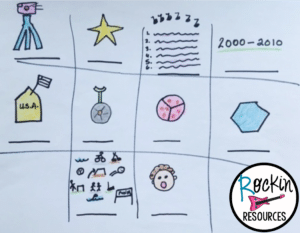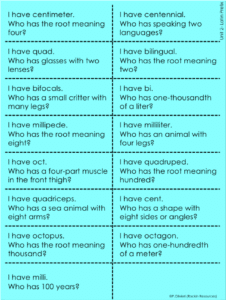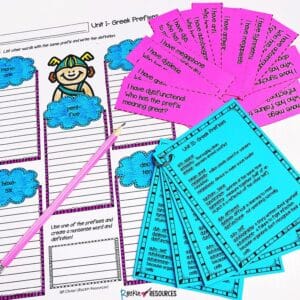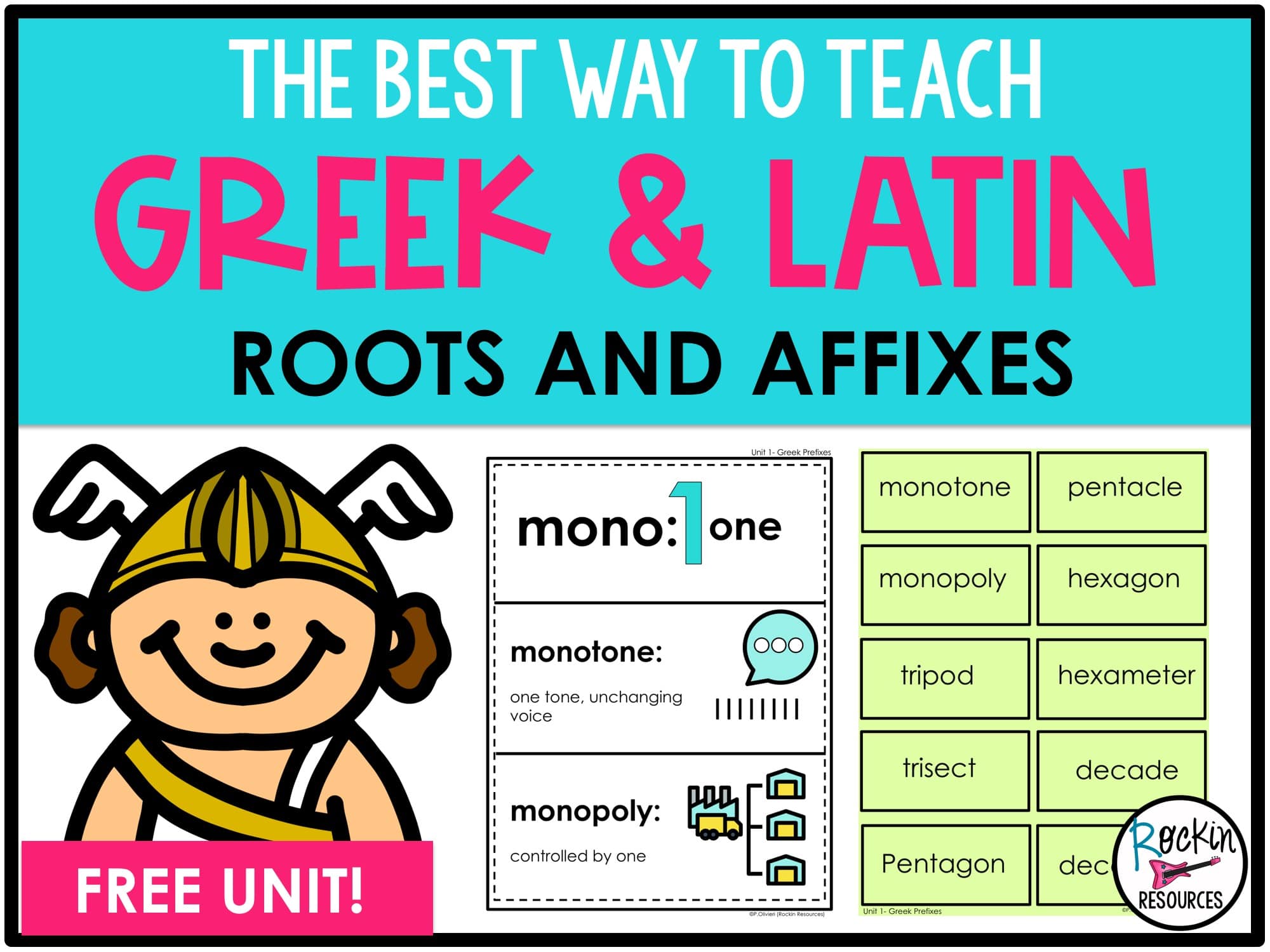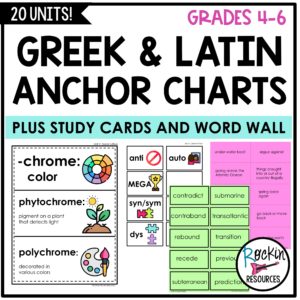Did you know that students should encounter a word up to 70 times before is is mastered? NO LIE! That is why teachers need to provide practice, practice, practice for words they want students to learn! Check out the EFFECTIVE WAYS TO TEACH GREEK AND LATIN ROOTS AND VOCABULARY!
Day 1
If you are using Greek and Latin root words or affixes for your study, introduce the root word or affix and its meaning. Brainstorm words that have that same root word or affix.
Then, introduce the vocabulary words by having students look them up in the dictionary. This will help students retain the word meaning and give them dictionary practice. I like to give students a matching sheet where they still need to look up the word, but the definition is there as one of the choices. There are so many multiple meaning words that simply looking the word up could get a variety of answers and it might not be the one you want them to learn. So, make it easy on yourself! I make this a quick activity and review it with them. If someone isn’t finished, that’s ok! Just make sure they have the right answers. We use this for studying for the week or you can give them flashcards to study.
Next, add the words to a word wall in your classroom. This is extremely important so you can refer to it and students can see it throughout the week! Whether they are getting in line, going to the restroom, or sharpening a pencil, they have that chance to look at it! Below is an example of a Greek and Latin display that can temporarily used for that week. You can also put them on the wall and add to them each week.
Another idea is have students create a sentence for each of the words. What I like to do is have students leave a blank for where the vocabulary word belongs like a fill-in-the-blank. I tell them that the sentence needs to have enough detail in it so another classmate can guess the word.
Ex. She placed her telescope on a _____________ to look at the stars in the sky. Then when they exchange papers, their peer fills in the blank. (The answer here is tripod.)
Day 2
It is time to play a game! My favorite vocabulary game is Hedbanz! I use it in all subjects! I’m sure you’ve seen this game in stores. Kids love it as much as I do. With this game, students have to guess the word that is on their head. (Make cards with the vocabulary words for that week.) You will love all the chatter about the words you want them to learn!
Next, have students guess words in a story. I like to provide a story with hints in the sentences to help them guess the correct word. Sometimes the stories get silly and that makes it fun! Here is an example of a story from one of our Greek and Latin Units.
Shelly was having trouble sleeping. It has been a whole decade since she was able to saw wood! She tried many outrageous attempts to try to catch a wink. First, she participated in all ten events of a decathlon. The exhausting competition did not help her sleep so she rode her unicycle around the outside of the Pentagon in Washington, DC for 5 days. She decided to go home and get some cheese for a snack. She trisected the cheese so she could have it again for two more nights. When Shelly tucked herself in bed that night, her eyes remained wide open! Since she was still awake, she put her telescope onto a tripod and glanced up at the pentacle in the night sky. The room was so quiet that she heard crickets singing in a hexameter verse. They were all in unison too! What finally put Shelly to sleep? She started counting sheep on her hexagon-shaped ceiling. Why didn’t she think of that earlier? She was now snoring. Zzzzzzzzzzzz!
Day 3
I like to do this next activity in groups. Depending on the type of vocabulary, a word web can be anything that you want it to be. Synonyms, antonyms, origin, nonsense words, images, etc. Students brainstorm or research words and fill in each category. I like to split the words up in the different groups and then come back together and share their findings.
Then, whether or not you included drawings on the group word web, have students draw a picture depicting each word. This is another way to help student truly grasp the word. I like to make a game out of this too! I have my students write the answers on a separate piece of paper so we can exchange them and guess each other’s pictures.
Day 4
Play the game I Have Who Has. These are easy to make for your word list. Shuffle and pass them out. Then you can collect the words and repeat it again! You can use this as a whole group or in smaller groups.
Then, I like to incorporate some sort of technology throughout the week. Since most of my students have computer access, I have them either create a crossword puzzle in Puzzlemaker or one of my students will make a Quizlet . They love to compete against each other on Quizlet to see who can get the best time. If students don’t have internet access, they can create flashcards to play the game Concentration.
Day 5
We have one last review. I might have students act out a word or even have them create a jingle with some or all of the words and share it before the quiz. For the quiz, I like to include a spiraling review. I include 5 questions at the end of each test where students have to remember past words studied in class.
Idea: For each word list of the year, provide students with a copy of the words and their meanings. I like to do this in small cards and add them to a metal ring. You can also keep them in a notebook. That way students have all the words to study for the spiraling review.
I hope you found some ideas to use with your students! You will be surprised at how much they retain by the end of the year!
GRAB UNIT 1 FOR FREE!!!
See Similar Blogs:
Discover Related Resources:
-
Greek and Latin Roots – Prefixes, Suffixes Study Units Bundle – 20 UNITS!
Original price was: $59.98.$24.00Current price is: $24.00. -
Greek and Latin Roots- Study Units for Prefixes and Suffixes
Original price was: $29.99.$19.99Current price is: $19.99. -
Greek and Latin Study Units #2
Original price was: $29.99.$19.99Current price is: $19.99.


